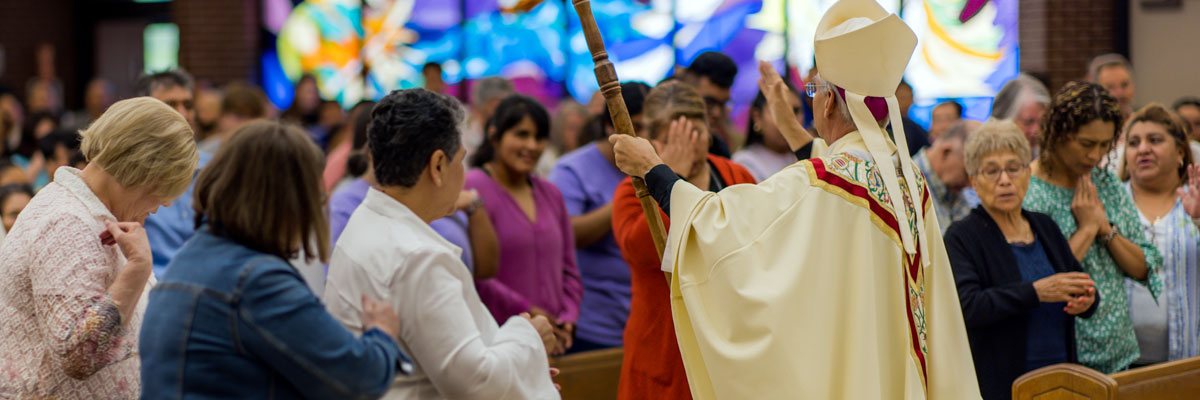Official Website of the
Catholic Diocese of Little Rock
2021 Priest Jubilarian Mass
Published: June 29, 2021
Bishop Anthony B. Taylor preached the following homily on the Solemnity of Sts. Peter and Paul, Apostles, at the Cathedral of St. Andrew in Little Rock on Tuesday, June 29, 2021.

Bishop Taylor
Like many of you, when I was discerning whether to enter the seminary, I attended a few of activities sponsored by our vocations office, some of which were helpful, but others missed the mark. I remember viewing one film intended to show how much fun it was to be a priest, and asking myself: “Why then are so many men leaving the priesthood these days?” ... It was the early 1970s.
And anyway, I didn’t feel drawn to the priesthood because I was looking for fun, I felt inspired by Jesus’ invitation to make a difference in the lives of others, to live for something bigger than myself, but most of all because I thought that was what God was calling me to do. I figured I would be happy doing God’s will, but happy is not the same thing as fun.
Then there was another film about a priest who was a deeply committed social worker. He arrived home exhausted at night after doing good deeds all day long, but the film failed to show any connection between this good work and the need for a solid prayer life, the relationship with Jesus that makes it all possible. Even then I knew that being a priest meant more than just doing good deeds; it meant embracing Jesus’ cross with love as God’s gift for my salvation and that of others.
We preach the “exaltation” of the cross of Jesus not to exalt suffering in itself, but rather because it is our greatest proof of just how completely God loves us. This cross points to a God who participates in human suffering as a fellow sufferer.
And what makes that burden light is nurturing daily a living relationship with Jesus, who then ends up being the one bearing most of the load. The priest in that second film looked to me like he was headed for burnout, which was another reason why so many were leaving the priesthood at that time.
Though some undoubtedly felt alone and unsupported, their heroic efforts unappreciated, I am told that many of those who left had long since quit praying, or at least quit praying the Liturgy of the Hours, which apparently no longer “spoke” to them. To the degree that their relationship with Jesus suffered as a consequence, elements of their priesthood — especially celibacy and obedience — became an increasingly crushing burden, which — relying only on their own strength— they found they no longer had the ability to bear.
Today we celebrate the feast of Sts. Peter and Paul, which is very appropriate for this celebration honoring our jubilarians. Our jubilarians committed themselves many years ago to a life of sacrificial love as priests of the Lord, and to them we all want to express our profound gratitude and love.
Each of these priests has known his share of suffering — that’s what it means to embrace the cross — but they have done so with love, which is what makes the cross redemptive — and not merely a burden. And they have done so for reasons that go way beyond the simple desire to do good: they are priests — each of them “another Christ” — offering himself to the Lord in union with Jesus every time he celebrates Mass and every time he pours himself out in service of others.
It is that intimate relationship with Jesus that makes us priests (mediators between God and man) and not merely social workers with a Roman collar.
And that fits perfectly with our feast of the great martyrs, Sts. Peter and Paul, and on this day when we honor our jubilarians who have poured themselves out in ministry rooted in sacrificial love. In this ministry we are often confronted with human pain and suffering, about which we are often powerless to remedy. We ask: “Why would God permit such suffering in our world?” We preach the “exaltation” of the cross of Jesus not to exalt suffering in itself, but rather because it is our greatest proof of just how completely God loves us.
This cross points to a God who participates in human suffering as a fellow sufferer. There is a joy in sacrificial love that is not of this world … and it is precisely that joy which you and I are called to proclaim, by our words and our deeds — each of us as another Christ. And you know, we don’t have to go looking for crosses — just ask our jubilarians.
Jesus’ cross is never far from those who truly follow him. And whenever our embrace of that cross is an expression of our sacrificial love united to that of Jesus, you can be sure that a joyful share in Jesus’ victory is close at hand as well. As they say: “Bear a cross and wear a crown!”









